Resources
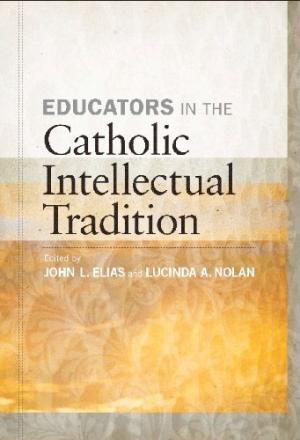
This book contains a collection of studies of prominent educators who have made significant contributions to handing on the Catholic intellectual tradition in the United States. These men and women have enriched this tradition by careful attention to educational theories and methods that find their origin in the Jewish and Christian past. Ancient Israel was assiduous in handing on the Torah or Law, the prophets dramatically called people back to the practices of the covenant, and the sages gave practical advice for everyday living. The Acts of the Apostles and the Letters of Paul chronicle the careful attention to safeguarding and transmitting the teachings in the early apostolic Christian communities. Contributors to this tradition in the past three centuries have been mainly European scholars. However, in the past two centuries educators in the United States have made notable contributions to the task of handing on the Catholic intellectual tradition.
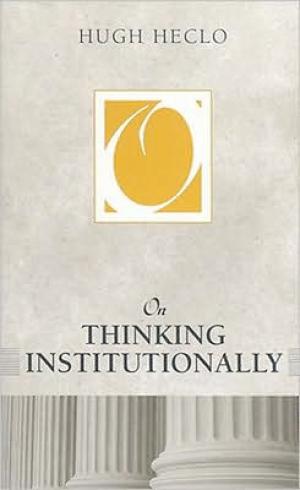
David Brooks discusses On Thinking Institutionally in a recent column. Read it here! David Brooks Column A brilliant look at institutions as popular as professional sports and as austere as the Supreme Court, all through the lens of what it means to "think institutionally." The twenty-first-century mind deeply distrusts the authority of institutions. It has taken several centuries for advocates of "critical" thinking to convince Western culture that to be rational, liberated, authentic, and modern means to be anti-institutional. In this mold-breaking book, Hugh Heclo moves beyond the abstract academic realm of thinking "about" institutions to the more personal significance and larger social meaning of what it is to "think institutionally." His account ranges from "respect for the game" of baseball to Greek philosophy, from twenty-first-century corporate and political scandals to Christian theology and the concept of "office" and "professionalism." Think what you will about one institution or another, but after Heclo, no reader will be left in doubt about why it matters to think and act institutionally. What do these things have in common? (From the Publisher)
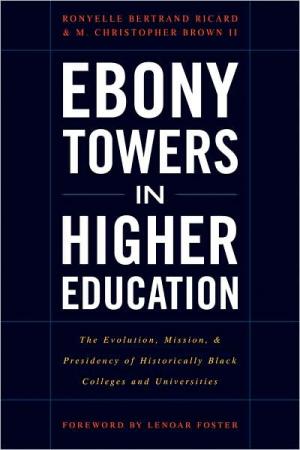
What is the purpose of black colleges? Why do black colleges continue to exist? Are black colleges necessary? Historically Black colleges and universities (HBCUs) are at the same time the least studied and the least understood institutions of higher education and the most maligned and the most endangered. This unique study examines the mission of four-year HBCUs from the perspective of the campus president, as a foundation for understanding the relevance and role of these institutions. This is the first research to focus on the role of presidents of black colleges; is based on extensive interviews with fifteen presidents; and takes into particular account the type of campus environments in which they operate. Unlike community colleges, women's colleges, men's colleges, and Hispanic-serving colleges, Black colleges are racially identifiable institutions. They also vary significantly in, among other characteristics: size, control (public or private), religious affiliation, gender composition, and available resources. Although united in the historic mission of educating African Americans, each black college or university has its own identity and set of educational objectives. The book examines how presidents define and implement mission in the context of their campuses, view the challenges they face, and confront the factors that promote or hinder implementation of their missions. (From the Publisher)
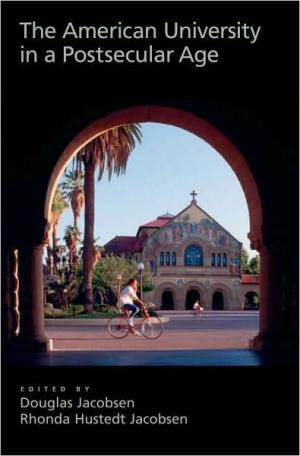
For much of the twentieth century, it was assumed that higher education was and ought to be a secular enterprise, but that approach no longer suffices. The culture has shifted, and contemporary college and university students are increasingly bringing religious and spiritual questions to campus. In response, college and university leaders are exploring anew the relationship between religion and higher education. The American University in a Postsecular Age grapples with key questions: —How religious or irreligious are faculty and students today? What level of religious literacy should be expected from students? —Can religion be allowed into the classroom without being disruptive? —Should colleges and universities help students reflect on their own faith? —Is religion antithetical to critical inquiry? —Can religion have a positive role to play in higher education? This is a state-of-the-art introduction to the national discussion about religion and higher education. Leading scholars and top educators express a wide spectrum of opinions that reflect the best current thinking. Introductory and concluding essays by the editors describe the postsecular character of our age and propose a comprehensive framework intended to facilitate ongoing conversation. (From the Publisher)
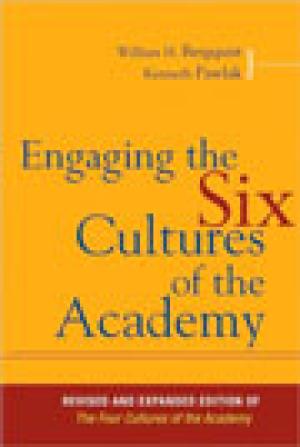
In The Four Cultures of the Academy, William H. Bergquist identified four different, yet interrelated, cultures found in North American higher education: collegial, managerial, developmental, and advocacy. In this new and expanded edition of that classic work, Bergquist and coauthor Kenneth Pawlak propose that there are additional external influences in our global culture that are pressing upon the academic institution, forcing it to alter the way it goes about its business. Two new cultures are now emerging in the academic institution as a result of these global, external forces: the virtual culture, prompted by the technological and social forces that have emerged over the past twenty years, and the tangible culture, which values its roots, community, and physical location and has only recently been evident as a separate culture partly in response to emergence of the virtual culture. These two cultures interact with the previous four, creating new dynamics. (From the Publisher)
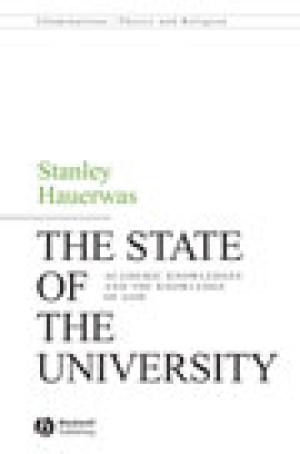
In this book, controversial and world-renowned theologian, Stanley Hauerwas, tackles the issue of theology being sidelined as a necessary discipline in the modern university. It is an attempt to reclaim the knowledge of God as just that – knowledge. * Questions why theology is no longer considered a necessary subject in the modern university, and explores the role it should play in the development of our “knowledge” * Considers how theology is often excluded from the knowledges of the modern university because these are constituted by an understanding of time necessary to make economic and state realities seem inevitable * Argues that it is precisely this difference that makes Christian theology an essential resource for the university to achieve its task - that is, to form people who are able to imagine a different world through critical and disciplined reflection * Challenges the domesticated character of much recent theology by suggesting how prayer and the love of the poor are essential practices that should shape the theological task * Converses with figures as diverse as Luigi Giussani, David Burrell, Stanley Fish, Wendell Berry, Jeff Stout, Rowan Williams and Sheldon Wolin * Published in the new and prestigious Illuminations series. (From the Publisher)
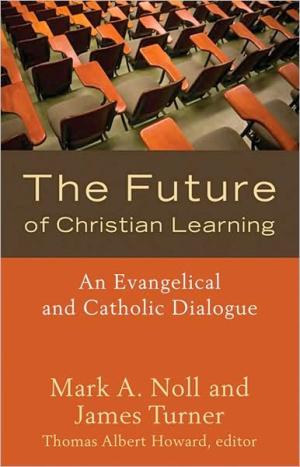
Evangelicals and Roman Catholics have been responsible for the establishment of many colleges and universities in America. Until recently, however, they have taken very different approaches to the subject of education and have viewed one another's traditions with suspicion. In this volume, Mark Noll and James Turner offer critical but appreciative reassessments of the two traditions. Noll, writing from an evangelical perspective, and Turner, from a Roman Catholic perspective, consider the respective strengths and weaknesses of each approach and what they might learn from the other. The authors then provide brief responses to each other's essays. Thoughtful readers from both traditions will find insightful and challenging ideas regarding the importance of Christian learning and the role of faith in the modern college or university. (From the Publisher)
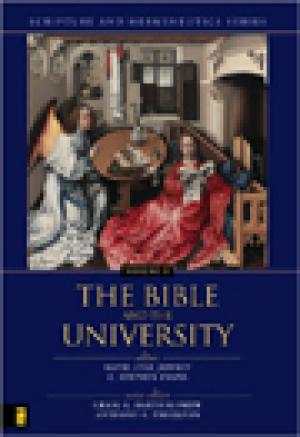
It is well known that the Western university gradually evolved from the monastic stadium via the cathedral schools of the twelfth century to become the remarkably vigorous and interdisciplinary European institutions of higher learning that transformed Christian intellectual culture in the thirteenth and fourteenth centuries. It is equally well known that subsequent disciplinary developments in higher education, including the founding and flourishing of many of the most prestigious of North American universities, owe equally to the Protestant and perhaps particularly Calvinist influence. But that the secularized modern university that descended from these developments is now in something of an identity crisis is becoming widely and often awkwardly apparent. The reason most often given for the crisis is our general failure to produce a morally or spiritually persuasive substitute for the authority that undergirded the intellectual culture of our predecessors. This is frequently also a reason for the discomfort many experience in trying to address the problem, for it requires an acknowledgement, at least, that the secularization hypothesis has proven inadequate as a basis for the sustaining of coherence and general intelligibility in the university curriculum. Nowhere is this more apparent than in the disciplines of biblical studies and theology, which once were the anchor or common point of reference for theological thought, but which are now both marginalized in the curriculum and internally divided as to meaning and purpose, even where the Church itself is concerned. In this final volume of the Scripture and Hermeneutic Series, a group of distinguished scholars havesought to understand the role of the Bible in relation to the disciplines in a fresh way. Offered in a spirit of humility and experimentally, the essays here consider the historic role of the Bible in the university, the status of theological reflection regarding Scripture among the disciplines today, the special role of Scripture in the development of law, the humanities and social sciences, and finally, the way the Bible speaks to issues of academic freedom, intellectual tolerance, and religious liberty. Contributors Include: Dallas Willard William Abraham Al Wolters Scott Hahn Glenn Olsen Robert C. Roberts Byron Johnson Robert Cochran, Jr. David I. Smith John Sullivan Robert Lundin C. Stephen Evans David Lyle Jeffrey (From the Publisher)
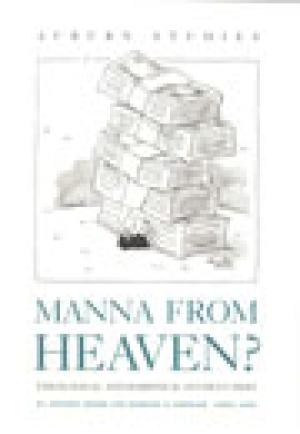
Although indebtedness is still not a major problem for most theological and rabbinical students, levels of indebtedness have risen steeply in recent years. These increases are usually the indirect and cumulative result of decisions made by theological and rabbinical schools. This article outlines the findings and recommendations of the National Study of Theological Student Indebtedness, conducted between 1990 and 1994 by the Auburn Center for the Study of Theological Education. We intend this report for those who must make decisions about the financing of theological education: administrators; faculty and trustees of theological and rabbinical schools; leaders of religious bodies that support such schools and their students; and present and prospective students. Those who seek a brief summary of the findings will find it in the italicized paragraphs that conclude each section of this articles. A detailed report on the research and its findings will be available at cost from the Auburn Center in mid-1995. (From the Publisher)